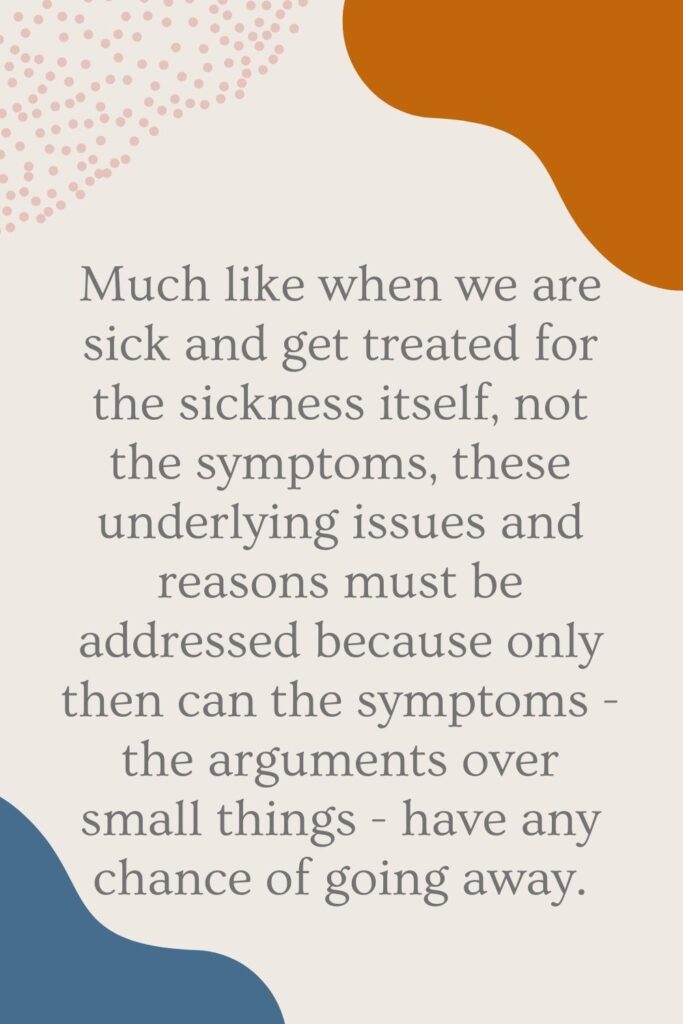Have you ever found yourself in a heated argument over something seemingly insignificant? It’s a common phenomenon that we’ve all experienced at some point. But have you ever stopped to wonder why we argue over small things? The answer may surprise you. In this article, we’ll explore the reasons behind these seemingly irrational disputes and shed light on the psychology behind our tendency to engage in heated debates over trivial matters. Get ready to delve into the fascinating world of human behavior and uncover the truth behind our arguments over small things.
Causes of Arguments Over Small Things
Emotional attachment
Arguing over small things often stems from our emotional attachment to those things. We may have sentimental value attached to an object or particular way of doing things, and any attempt to challenge or change it can be met with resistance and argument. For example, if your partner suggests rearranging the furniture in your living room, you might feel a strong emotional attachment to the current layout and argue against the change.
Perceived threat to identity
When small arguments arise, it is often because we perceive them as a threat to our identity. Our beliefs, values, and sense of self can become intertwined with certain preferences or habits. For instance, if someone questions your taste in music or criticizes your cooking style, you might feel the need to defend yourself and argue in order to protect your sense of identity.
Lack of perspective
Arguments over small things can also occur due to a lack of perspective. Sometimes, we get so caught up in the minor details that we lose sight of the bigger picture. This lack of perspective can make us overly invested in trivial matters and lead to unnecessary arguments. It is important to step back and evaluate whether the issue at hand is truly worth arguing about in the grand scheme of things.
Control issues
Control issues can play a significant role in arguments over small things. Some individuals have a strong desire to have things go their way and to maintain control over their environment. When these individuals encounter resistance or alternative ideas, they may become argumentative as a means of maintaining control and asserting their authority. This need for control can escalate even the smallest disagreements into heated arguments.
Communication breakdown
Poor communication is often at the heart of arguments over small things. When individuals cannot effectively express their thoughts, feelings, or needs, misunderstandings can arise. Misinterpreted intentions or messages can quickly lead to conflict, particularly in situations where emotions are involved. Without clear and open communication, even small disagreements can escalate into full-blown arguments.
Effects of Arguing Over Small Things
Strained relationships
Continuous arguing over small things can strain relationships, particularly if the arguments are not resolved or if they become frequent. Constant conflict erodes trust and can create a toxic dynamic within relationships, leading to emotional distance and potential breakdowns in communication.
Negative emotions
Engaging in arguments over small things often results in negative emotions for all parties involved. Anger, frustration, resentment, and even sadness can arise during and after disagreements. These negative emotions can linger and impact both mental and physical well-being, creating a negative atmosphere within relationships.
Wasted energy
Arguing over small things consumes significant amounts of energy that could be better directed towards more productive and fulfilling endeavors. Instead of investing time and effort into personal growth, creative pursuits, or meaningful connections, energy is wasted on trivial arguments that ultimately yield little to no positive outcomes.
Decreased productivity
When small arguments arise in professional settings, they can lead to decreased productivity. Team members who are constantly engaging in disagreements over minor details may lose focus on the bigger goals or projects at hand. This can hinder progress, cause delays, and create a tense work environment that impacts overall productivity.
Diminished satisfaction
Frequent arguing over small things can lead to diminished satisfaction and enjoyment in various aspects of life. Whether it is within romantic relationships, friendships, or professional environments, the constant presence of conflict and tension can detract from overall happiness and fulfillment. It becomes challenging to find joy when one is constantly engaged in arguments over seemingly inconsequential matters.

This image is property of whattogetmy.com.
Cognitive Biases Amplifying Small Arguments
Confirmation bias
Confirmation bias is the tendency to seek out and interpret information that supports our existing beliefs while ignoring or dismissing contradictory evidence. This bias can amplify arguments over small things because it leads individuals to selectively focus on evidence that validates their own perspective, making it difficult to reach a resolution.
Availability heuristic
The availability heuristic is a mental shortcut that biases our judgments based on how easily information comes to mind. In the context of arguments over small things, this bias can occur when individuals rely on recent or memorable examples to support their point of view, rather than considering a broader range of evidence or alternative explanations.
Anchoring effect
The anchoring effect refers to the tendency to rely too heavily on the first piece of information encountered, even when subsequent information may offer a more accurate assessment. In arguments over small things, individuals may anchor themselves to their initial opinion or position, making it challenging to shift perspectives or find common ground.
Fundamental attribution error
The fundamental attribution error occurs when individuals attribute others’ behavior to internal characteristics rather than considering external factors or situational influences. In small arguments, this bias can cause individuals to overlook external factors contributing to the disagreement and instead attribute it solely to the other person’s personality or character.
Halo effect
The halo effect is a cognitive bias in which an individual’s overall impression of another person shapes their evaluation of specific traits or abilities. In small arguments, this bias may lead individuals to discredit the other person’s perspective based on a negative impression they hold, without objectively assessing the merits of their argument.
The Role of Context in Small Arguments
Cumulative stress
Small arguments can be magnified by the presence of cumulative stress in various areas of an individual’s life. When stressors from work, personal relationships, or other responsibilities accumulate, individuals may have lower tolerance and patience for minor disagreements. This overall stress can increase the intensity and duration of small arguments.
External factors
External factors, such as environmental influences or situational circumstances, can contribute to small arguments. For example, being in a crowded or noisy environment may heighten irritability and make individuals more prone to arguing over small things. Similarly, external stressors like financial difficulties or health issues can amplify the significance of trivial disagreements.
Cultural influences
Cultural norms and values play a role in shaping how individuals perceive and respond to small arguments. Different cultures may place varying emphasis on the importance of individual opinions, collective harmony, or authority figures. These cultural influences can impact the frequency and intensity of arguments over small things, as well as the preferred methods of conflict resolution.
Personal experiences
Past experiences, both positive and negative, can shape an individual’s inclination to argue over small things. Traumatic experiences or unresolved conflicts may make individuals more defensive or sensitive to minor disagreements. Conversely, positive experiences of open communication and effective conflict resolution can foster healthy approaches to resolving small arguments.
Power dynamics
Power dynamics can heavily influence small arguments, particularly in hierarchical relationships. When there is a significant power imbalance, the less powerful individual may feel hesitant to express their opinions or desires, leading to pent-up frustration and potential explosive arguments over inconsequential matters. It is essential to recognize and address power dynamics to foster healthier communication and prevent unnecessary conflict.

This image is property of s35018.pcdn.co.
Psychological Factors in Arguing Over Small Things
Ego defense mechanisms
Ego defense mechanisms, such as projection or denial, can contribute to arguing over small things. These defense mechanisms serve as a way to protect one’s self-esteem and avoid feelings of vulnerability or criticism. For instance, if someone feels insecure about their intelligence, they may constantly argue over small intellectual matters to maintain a sense of superiority.
Insecurity and self-esteem
Insecurity and low self-esteem can play a significant role in arguing over small things. When individuals feel inadequate or uncertain, they may become defensive and argue vehemently to protect their fragile self-image. Small arguments can serve as a battleground to bolster their ego and establish a sense of self-worth.
Need for validation
The need for validation can fuel arguments over small things. When individuals seek external validation and affirmation, even minor disagreements can become a means to assert their opinions and gain recognition from others. The desire to be seen as right or to receive approval can escalate arguments beyond their initial importance.
Desire for control
A desire for control often underlies arguments over small things. Individuals who value maintaining control may use even minor disagreements as a means to exert dominance and ensure their preferences prevail. Arguing becomes a power play aimed at establishing authority and influencing outcomes in their favor.
Unresolved past conflicts
Unresolved past conflicts can resurface in arguments over small things. Lingering resentment or unresolved issues can fuel the intensity and duration of minor disagreements. Small triggers may activate deeper emotions and wounds, leading individuals to overreact and bring up past grievances during arguments over seemingly insignificant matters.
Communication Styles and Small Arguments
Passive-aggressive behavior
Passive-aggressive behavior is often present in arguments over small things. Rather than openly expressing their concerns or frustrations, individuals may resort to subtle jabs, sarcasm, or indirect remarks. This communication style can escalate conflicts and perpetuate a cycle of misunderstandings and unresolved issues.
Avoidance and withdrawal
Some individuals respond to arguments over small things by avoiding or withdrawing from the conflict altogether. They may prefer to suppress their own viewpoints, give in to the other person’s demands, or simply disengage from the conversation. While this approach may temporarily diffuse tension, it does not address the underlying issues and can lead to long-term dissatisfaction and resentment.
Escalation and aggression
Arguments over small things can quickly escalate into aggression and heated exchanges. As emotions intensify, individuals may resort to personal attacks, raised voices, or even physical confrontation. This destructive communication style hinders effective conflict resolution and perpetuates a cycle of hostility and resentment.
Assumptions and mind-reading
Assumptions and mind-reading contribute to misunderstandings and arguments over small things. Rather than openly communicating and seeking clarification, individuals may make unfounded assumptions about the other person’s intentions or motives. These assumptions can lead to misinterpretations and unnecessary conflict.
Poor listening skills
Poor listening skills play a role in fueling arguments over small things. When one or both parties fail to actively listen and genuinely understand the other person’s perspective, misunderstandings and frustrations can arise. Active listening, which involves attentive listening and empathetic understanding, is essential for effective communication and conflict resolution.

This image is property of couplestherapycenterofnj.com.
Patterns and Triggers in Arguing Over Small Things
Repetitive patterns
Arguing over small things can create repetitive patterns within relationships. The same issues may resurface repeatedly, leading to a sense of frustration and futility. Breaking these patterns requires open communication, willingness to compromise, and a focus on finding long-term solutions rather than engaging in constant arguments.
Trigger phrases or actions
Certain phrases or actions can act as triggers for arguments over small things. These triggers may evoke strong emotional responses or remind individuals of past conflicts or insecurities. Identifying these triggers and proactively addressing them can help reduce the occurrence and intensity of small arguments.
Unresolved conflicts
Unresolved conflicts from the past can serve as a catalyst for arguing over small things. Lingering resentment or underlying issues that were never fully addressed can resurface during minor disagreements, amplifying their importance and prolonging conflicts. Addressing and resolving past conflicts is crucial for minimizing the recurrence of arguments over small things.
Lack of compromise
A lack of willingness to compromise can perpetuate arguments over small things. When individuals become entrenched in their own viewpoints and refuse to consider alternative perspectives or solutions, conflicts can escalate. Cultivating a mindset of flexibility and compromise can help prevent small arguments from spiraling into larger, more significant disputes.
Unmet expectations
Unmet expectations contribute to arguments over small things. When individuals have different expectations or assumptions about how things should be, even minor deviations can lead to frustration and argumentation. Communicating expectations openly and actively negotiating compromises can help mitigate the impact of unmet expectations on the occurrence of small arguments.
The Role of Emotions in Small Arguments
Emotional regulation
Emotional regulation plays a vital role in preventing arguments over small things. When individuals can effectively manage and regulate their emotions, they are less likely to become reactive or defensive during disagreements. Developing emotional regulation skills, such as deep breathing, mindfulness, or seeking support from trusted individuals, can help diffuse tensions and foster healthier communication.
Emotional contagion
Emotional contagion refers to the phenomenon of emotions spreading from one person to another. In the context of small arguments, one person’s heightened emotions can quickly escalate the conflict and trigger emotional responses in others. Recognizing emotional contagion and actively working to diffuse emotional intensity can prevent small disagreements from escalating into full-blown arguments.
Emotional triggers
Individuals may have specific emotional triggers that intensify arguments over small things. These triggers can be rooted in past experiences, underlying insecurities, or unresolved conflicts. Identifying and communicating these triggers within relationships can help create a safer and more understanding environment, minimizing the occurrence of triggered arguments.
Emotional insecurity
Emotional insecurity can contribute to arguments over small things. When individuals have deep-seated feelings of inadequacy or fear of rejection, even minor disagreements can activate these insecurities, leading to heightened emotional responses. Building self-confidence and addressing underlying emotional insecurities can reduce the likelihood of arguments over small things.
Emotional intelligence
Emotional intelligence plays a crucial role in preventing arguments over small things. Individuals with high emotional intelligence are better equipped to understand and regulate their emotions, empathize with others, and communicate effectively. Developing emotional intelligence skills, such as self-awareness and empathy, can foster healthier communication and prevent unnecessary conflicts.

This image is property of i.ytimg.com.
Methods to Avoid Arguing Over Small Things
Active listening and empathy
Active listening and empathy are essential for effective communication and conflict resolution. By actively listening to the other person’s perspective, seeking to understand their emotions and needs, and responding with empathy, individuals can prevent disagreements from escalating into arguments. Validating the other person’s feelings and demonstrating a genuine desire to understand can help establish a foundation of trust and open dialogue.
Conflict resolution techniques
Learning and employing conflict resolution techniques can help individuals navigate arguments over small things more effectively. Techniques such as finding a compromise, reframing the issue in a more positive light, or using “I” statements to express thoughts and feelings can promote productive discussions and prevent small disagreements from becoming major conflicts.
Letting go of control
Letting go of control plays a significant role in avoiding arguments over small things. Recognizing that not everything needs to go exactly as planned and embracing flexibility can prevent the need to engage in constant power struggles. Allowing others to have their opinions, preferences, and methods can foster a more harmonious and cooperative environment.
Choosing battles wisely
Not every small disagreement warrants a full-blown argument. Choosing battles wisely involves determining the importance and potential long-term impact of the issue at hand. By prioritizing what truly matters and letting go of the minor disagreements, individuals can conserve their energy and minimize unnecessary conflict.
Building emotional intelligence
Developing emotional intelligence can significantly contribute to avoiding arguments over small things. By improving self-awareness, managing emotions effectively, understanding others’ perspectives, and communicating with empathy, individuals can foster healthier relationships and prevent trivial matters from escalating into heated arguments. Emotional intelligence can be enhanced through self-reflection, therapy, or personal development programs.
Conclusion
Arguing over small things is a common occurrence in relationships and various social settings. Understanding the underlying causes, effects, and psychological factors that contribute to these arguments is crucial for fostering healthier communication and preventing unnecessary conflicts. By employing strategies such as active listening, conflict resolution techniques, and emotional regulation, individuals can avoid the pitfalls of arguing over small things and create more harmonious and fulfilling relationships and environments.







